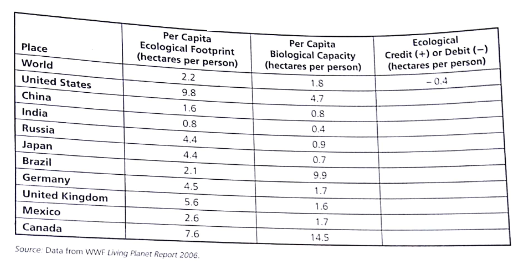
Environmental Science 14th Edition by Tyler Miller ,Scott Spoolman
Edition 14ISBN: 978-1111988937
Environmental Science 14th Edition by Tyler Miller ,Scott Spoolman
Edition 14ISBN: 978-1111988937 Exercise 15
If the ecological footprint per person of a country or the world (Figure 1-8) is larger than its biological capacity per person to replenish its renewable resources and absorb the resulting waste products and pollution, the country or the world is said to have an ecological deficit. If the reverse is true, the country or the world has an ecological credit or reserve. Use the data below to calculate the ecological deficit or credit for the countries listed and for the world.(For a map of ecological creditors and debtors see Figure 5, p. S27, in Supplement 6.)

Which two countries have an ecological credit Why do you think each of these countries has an ecological credit

Which two countries have an ecological credit Why do you think each of these countries has an ecological credit
Explanation
Brazil and Canada have an ecological cre...
Environmental Science 14th Edition by Tyler Miller ,Scott Spoolman
Why don’t you like this exercise?
Other Minimum 8 character and maximum 255 character
Character 255


